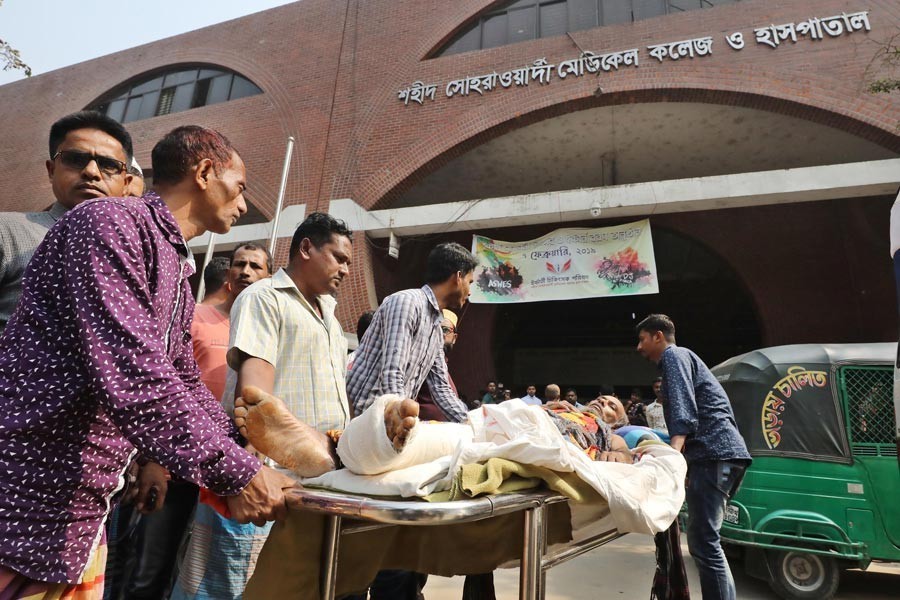
Published :
Updated :

Hospital is where patients seek cure for physical and mental suffering. Its emergency wards are supposed to attend patients immediately on patients' arrival in order to help them overcome a critical phase. But when a hospital finds itself in an emergency, the situation beggars description. On Thursday evening, the Shaheed Suhrawardy Medical College hospital in the capital struggled hard to deal with an emergency perhaps no government hospital in the country has ever faced. A fire broke out - originating, according to a report, from an electrical short-circuit in a medical college professor's room on the ground floor -- and forced a total evacuation of the medical facility.
As many as 1,200 patients including those from the intensive care unit (ICU) and surgical department had to be removed. It is not known if any surgical operation was on at the time the fire broke out. Some critical operations take hours and if such accidents occur midway in the operation, it is not easy to meet the emergency. Mercifully, though, all 1,200 patients, who were admitted to the hospital, reportedly could be brought out safely except a single case of casualty. A one-year old baby's life could not be saved during shifting to a private hospital nearby.
This is no mean achievement. Credit, however, goes to common people who rushed to voluntarily help hospital staff and attendants of patients. Particularly, the students of the medical college of the hospital and the nearby Sher-e-Bangla Agriculture University played an active role in getting the patients out of hospital wards. Once again, common people responded splendidly, like they did in the case of Rana Plaza disaster in Savar, to the emergency need of saving lives in danger. In a country where bestiality and cruelty of people often make newspaper headlines, the selfless service for the humanity shines as a guiding light for the nation.
This one-off incident may have brought out the best in a large number of people but under no circumstances is such an accident desirable. Infrastructure of any medicare facility should have a foolproof safety system. On Thursday, the timing of the hospital debacle was in favour of the patients. Had it stricken in small hours of the night or at odd hours, the public response would not have been so wide and effective for reasons understandable. The seven-member enquiry team should conclusively determine how and why the fire originated. The next task would be to suggest ways and means to stop recurrence of the accident. There should be in place a digital mechanism that would alert people responsible of any such accident well before it happens.
Now that a large hospital in the capital has witnessed this undesirable incident, other such establishments -- both government and private -- should be alarmed. Those should bring their electric wiring and controlling centres under rigorous scrutiny. Regular monitoring of the power system within hospitals must be carried out in order to check if there is any loophole through which disaster may strike. Indeed, the Suhrawardy hospital fire should act as a grave lesson for all such facilities in the country. Negligence of the power connection and distribution system with such facilities may prove fatal -- even more fatal than the negligence of duty by one or two physicians. In fact, lifves of doctors, nurses, attendants and of course of the patients are at risk if fire is all-engulfing.
Establishments like hospitals receive patients -- some of them in critical conditions -- round the clock. Both safety and security of such places should be at the top of the list because these are the ailing humanity's last resort. Those must not cause patients further trauma. And trauma they surely suffer from when they, with tubes and other instruments inserted into or attached to their bodies, are evacuated in a hurry and their beds are kept outside in the open. Many of the patients of Suhrawardy hospital have surely gone through such a trauma. This may haunt them for the rest of their lives. Some may need psychological counselling.


 For all latest news, follow The Financial Express Google News channel.
For all latest news, follow The Financial Express Google News channel.